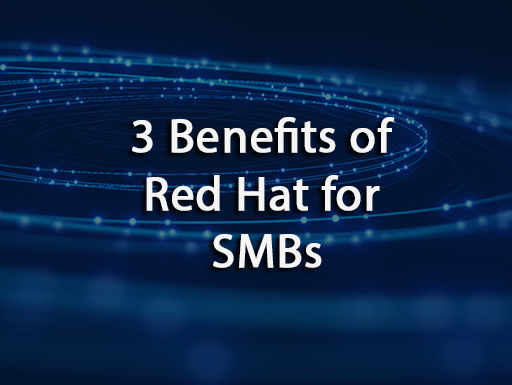3 Benefits of Red Hat for SMBs
May 17, 2022

As small and medium businesses (SMBs) adopt a cloud-first approach to technology that includes complex models, such as hybrid and multicloud, they face new challenges. These challenges include how to manage a complex and distributed infrastructure at scale, achieve end-to-end automation, and develop and test cloud-native apps.
Software solutions from Red Hat help SMBs tackle these problems so they can progress toward digital transformation and innovation. Red Hat offers Ansible, Enterprise Linux, and OpenShift platforms, which deliver business value, streamline infrastructure management, and accelerate DevOps processes.
Here’s a look at 3 benefits Red Hat solutions deliver to SMBs:
1) Accelerated cloud-native application development
To stay competitive and profitable, SMBs need to develop and test cloud-native apps quickly to get them to the market while still delivering quality.
Red Hat OpenShift helps these companies develop and run better quality cloud apps by streamlining the application lifecycle. OpenShift is a container platform built around Kubernetes and delivers a full developer experience, including automated container builds.
Red Hat Ansible also helps with application development by automating DevOps and delivery processes. Ansible combines automation language with cloud services and content for automating, deploying, and operating applications.
2) Adoption of end-to-end automation
Organizations need to identify and execute automation opportunities to optimize management of the network, IT infrastructure, and security operations. Manual management processes slow companies down and increase the chance of management errors.
Red Hat Ansible enables companies to achieve end-to-end automation by scaling and coordinating automation efforts. The Ansible automation platform is powerful and simple and integrates with hybrid cloud environments. With Red Hat Ansible, companies can develop and deploy automations for network, security, and application development.
Ansible provides capabilities for the entire lifecycle of an automation. Ansible automation content includes modules, playbooks, roles, plugins, docs, and tests. Automation modules can be linked together to develop entire workflows. Ansible Roles are automations that can be written once and then reused to solve problems across the business and accelerate the adoption of automations.
3) Establishment of a hybrid cloud foundation
Hybrid cloud is one of the most popular cloud models, making it crucial that SMBs lay a strong hybrid cloud foundation. Red Hat Enterprise Linux is an intelligent operating system that provides this foundation.
Red Hat Enterprise Linux creates a consistent experience across bare metal, public, and hybrid cloud architectures. Any kind of application can be delivered in any type of environment. Enterprise Linux also allows for an easy transition to containerized workloads using container management tools.
When companies have built a consistent hybrid cloud foundation, they deliver workloads faster and easier, reduce friction when making changes, and increase agility. Linux Enterprise is focused on security, providing security for cloud environments and emerging workloads, such as artificial intelligence and machine learning processes.
Taking Advantage of Red Hat Benefits
Each Red Hat platform presents its own benefits and value for SMBs. Working with a technology provider that has Red Hat expertise will help you decide which platform makes the most sense for your company.
ProActive Solutions offers Red Hat software solutions as part of our infrastructure capabilities. We provide Red Hat-certified expertise to companies that want to expand their automation capabilities, lay a foundation for hybrid cloud, and develop cloud-native apps. Our team takes a consultative approach, working with your team to design custom solutions that align with your business goals.
Find out how Red Hat platforms fit into your business. Request a custom whiteboard session with the Red Hat software experts at ProActive.
